Springtime Sensory Play: Outdoor Activities for Children with Sensory Processing Disorders
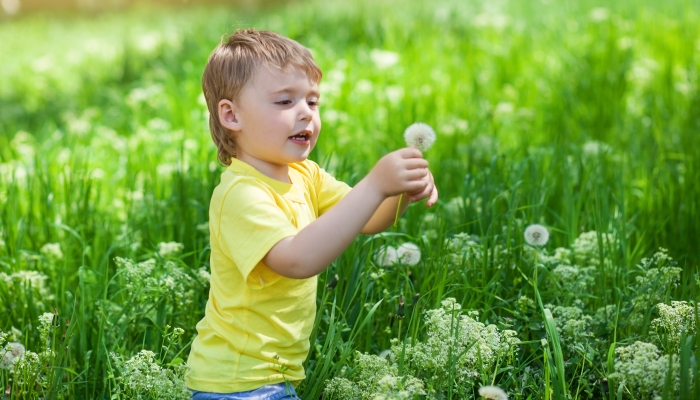
- Children with sensory processing disorders may be more sensitive to sensory stimuli, though some may also be less sensitive to certain stimuli.
- Outdoor sensory play is a perfect way to engage your child’s senses and encourage them to explore the wider world.
- Some activities are perfect for burning off energy and encouraging active play, whereas others are ideal for instilling calm and helping your child regulate their nervous system.
- You may need to modify activities to ensure they are suitable for your child.
Sensory processing disorder (SPD) is a condition that impacts how we interpret and react to stimuli. The condition varies greatly between individuals and is thought to affect as many as 1 in 20 people. Children with sensory processing disorder may benefit from sensory play and time outdoors.
Spring is one of the best seasons for outdoor sensory activities. The cold of winter has passed, and the glaring heat of summer has not yet arrived. Nature is beginning to bloom, the leaves are growing on the trees and beautiful flowers are peeking up from the soil.
Thanks to the mild weather, spring is the perfect time for outdoor sensory play. While the changing weather may be a problem in some places, suitable outdoor clothing makes outdoor play possible whatever the weather.
Spring-themed outdoor sensory play is the perfect way to engage your child with the great outdoors. Give your child a sensory experience with all the wonder spring has to offer, from the birds chirping to the smell of new flowers and the feel of long grass against your skin. Encourage your child to engage their entire sensory system with the activities below.
Tactile Activities
The best thing about outdoor sensory play is that you don’t need to worry so much about the mess. Here are some engaging sensory outdoor activities for kids to try:
Water Play
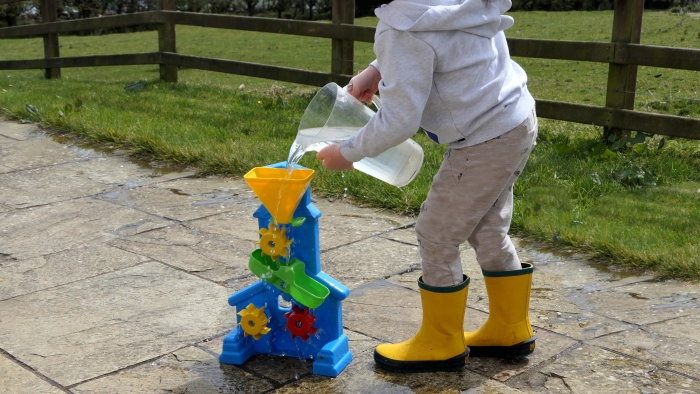
Water play is usually a hit with kids of all ages. All you need is to fill a container with water; you could use a water table, a wash tub, or a kiddie pool. Next, you’ll need some pouring and scooping toys for your child to play with. Funnels, sieves, pipettes, and water guns are always popular choices.
Dress your child in clothes that can get wet, and ensure you have a towel nearby to dry them off when they’re done. If your kid isn’t fond of cold water, you can use warm water instead.
Archeologist
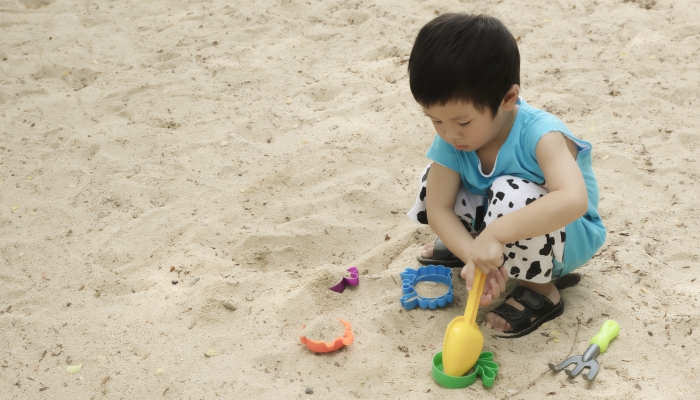
If your child loves digging, this activity is bound to be a hit. First of all, you’ll need a sand pit or sand table and some toys to bury. Provide a range of spades, scoops, and sifters, so your child can rummage through the sand to find the missing toys. Have some buckets on hand, so your child can build a sandcastle after if they want.
Mud Chef
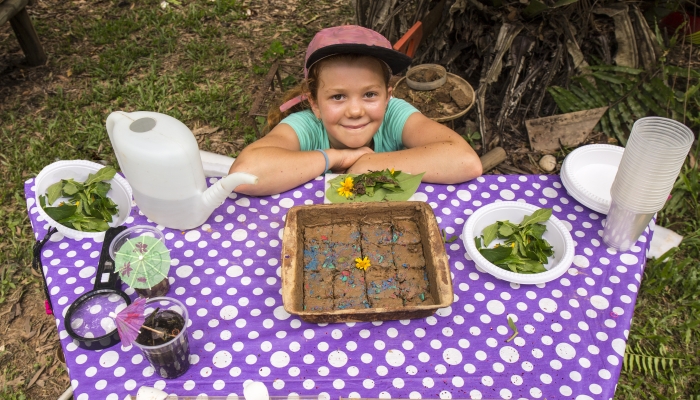
You can’t get more tactile than mud play. An outdoor mud kitchen will provide hours of fun. You’ll need some soil, some water, and plenty of containers for “cooking” in. Toy pots and pans are great for this, and you’ll need some plates so your budding chef can serve up their mud pies. Expect some mess with this activity.
Sensory Walk
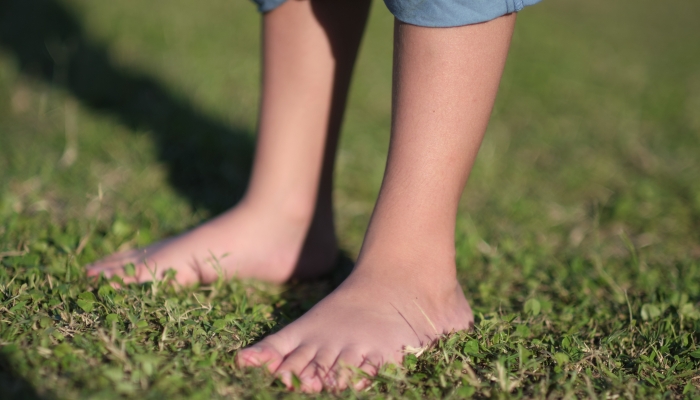
This fun activity is perfect for kids who don’t mind getting their feet dirty. Fill some sensory trays with different materials for a barefoot walk. For example, fill one tray with sand, one with water, another with jello, and one with mud. Have your child walk barefoot through each sensory tray and describe how it feels; this will help to improve their language skills and language development. Be mindful of the floor surface, as this activity can create a slippy mess.
Auditory Activities
A 2017 review published in the International Journal of Environmental Research and Public Health11. Franco, L. S., Shanahan, D. F., & Fuller, R. A.. A Review of the Benefits of Nature Experiences: More Than Meets the Eye. International Journal of Environmental Research and Public Health. 2017;14(8), 864. https://doi.org/10.3390/ijerph14080864 states that “Natural sounds and smells underpin experiences of nature for many people, and this may well be rooted in evolutionary psychology.” To make the most of this evolutionary leftover, here are some auditory outdoor sensory activities to try:
Creating Outdoor Music with Objects
- ♪MUSICAL ENLIGHTENMENT – Our 8 color music bells are marked notes from Middle C, D, E, F, G, A, B to High C. Corresponding note and scale position on the top of each handbell provides guidance in playing. Easy and fun music toy for kids to play simply music songs. Perfect toddler musical instruments for kids to get involved with music experience in early age.
- ♪PREMIUM PACKAGE SET & BONUS 17 MUSIC SONGS – Set of 8 Colourful Hand Bells and a Songbook included 17 popular songs. We have included “Jingle Bell”and “Happy Birthday” in our songbook which are great fun for toddles to start with their musical journey.
- ♪DEVELOPMENT BENEFITS – A great musical instruments for toddles and pre-school kids. Playing handbell is a great way to enhance their strong rhythmic skills, creativity, hand-eye coordination, sensory development and the basics of music reading. This childrens hand bell set is perfect for home, school, daycare, church choir, or learning centers.
- ♪DESIGNED FOR KIDS – Our rainbow kids handbells are a great percussion instrument toy, suitable for children aged 3 years and over. Health and safety should be the top priority for a child. We know how important your child’s safety is for parents. Our Rainbow 8 notes hand bells set is made of high-quality BPA, lightweight, well-tuned, and ideally a Christmas or birthday gift for children.
If your child loves making noise, they’ll love creating outdoor music in your garden. You can use whatever you have to make music outdoors. Wind chimes hanging from a ledge can be disturbed to make beautiful sounds, plant pots can be played with sticks, and balls can be bounced to make a rhythmic beat.
Alternatively, you can bring instruments from your home outside so your child can make a racket without worrying about the neighbors. This set of eight hand bells will make a tuneful addition to your family instrument collection.
Listening to Natural Sounds
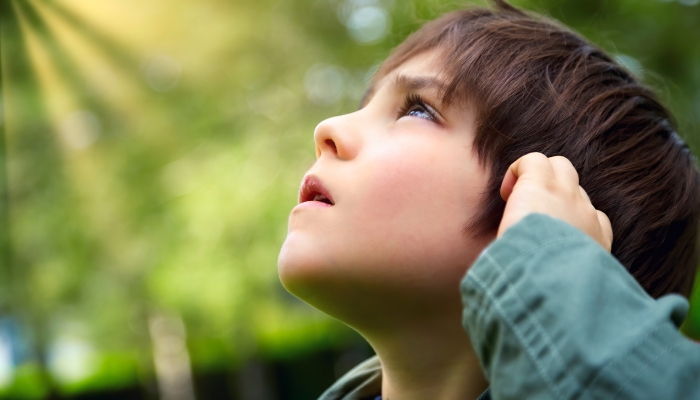
Auditory sensory activities don’t have to be noisy. Honing in on individual sounds is a simple calming activity that you can do anywhere. Sit quietly in your yard and challenge your child to identify five sounds. They might notice the buzzing of a bee, the distant zoom of an airplane, the sound of neighbors chatting, or the chirping of a nearby bird. Take turns to point out new sounds and figure out what they are.
Visual Activities
With the vibrant colors of spring, this season is a perfect time for visual sensory activities. Try the following outdoor sensory play activities in your yard this springtime:
Color Hunts in Nature
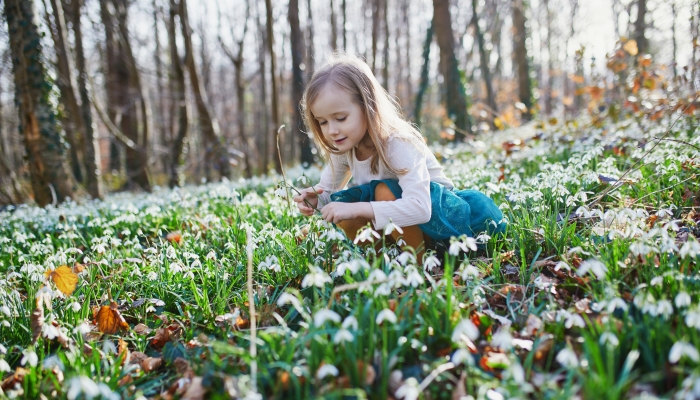
Challenge your child to create a rainbow using things they find outdoors. Ask them to point out reds, oranges, yellows, and so on from the natural world. You can even create a collage using the things they find on their nature hunt, though you might be better off doing this in an area with abundant wildflowers rather than in your own garden unless you’re ready to say goodbye to your spring flowers.
Outdoor Artist
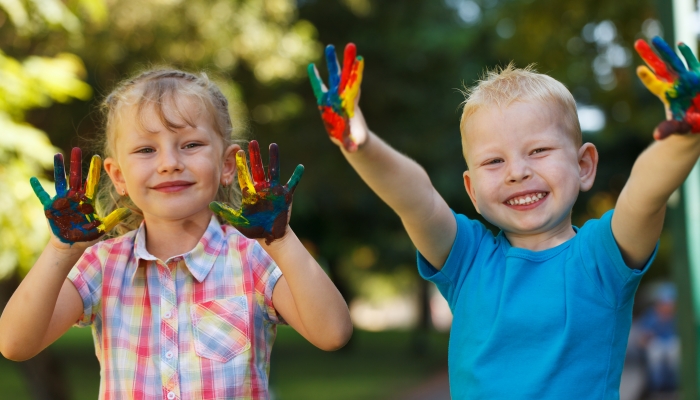
This is a fun activity you can repeat time and time again to develop those fine motor skills. Pick a landscape you’d like to recreate and pack an easel, some paper, and your art supplies. Your child will love trying to capture the landscape on paper.
You could use pastels, watercolors, or fingerpaints to recreate the scene. Finger painting has the added benefit of offering a tactile experience, though you’ll need plenty of baby wipes to clean up the mess after you’re done.
Cloud Spotter
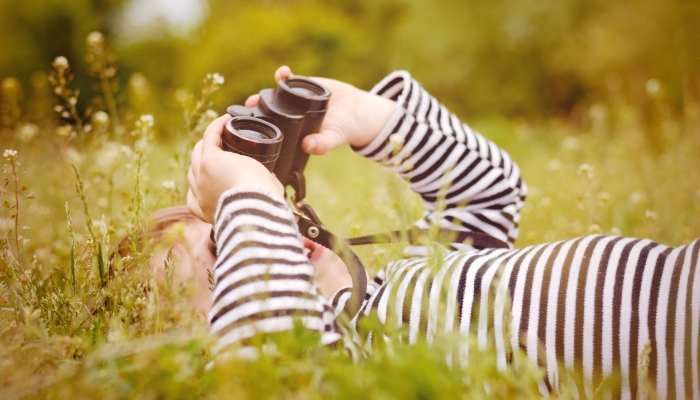
You know how sometimes clouds look like dogs or trees or your cousin Martin? Well, this is a fun calming activity for five minutes of downtime. Get comfy on your back and gaze up at the sky. You can use a picnic blanket or lie on the grass for a sensory experience. Look up at the clouds and point out what the various clouds are shaped like.
Vestibular and Proprioceptive Activities
The vestibular system and proprioceptive system control how to deal with balance, movement, and how we move through space. Here are some outdoor sensory activities to try:
Balancing Games
Outdoor play is the perfect way for your child to develop their gross motor skills and burn off some energy. Why not place an outdoor game of the floor is lava so your child can balance, climb, and run around to their heart’s content? We love these cute stepping stones and this Montessori balance beam as safe places to escape from the lava.
- 【Develop Balance & Coordination】Balance Stepping Stones for Kids help your child build confidence in their balance and coordination. Each side of the kids stepping stones vary in steepness and difficulty, playing with the stepping stones kit helps them learn to determine distance and height.
- 【Indoor & Outdoor Obstacle Course】Children could strengthen their core and stay active as they step from stone to stone and try to maintain balance without slipping! These balance blocks promote physical activity and active play, inspiring your child to jump, stretch, climb, and balance for full-body exercise.
- 【Various Game Ideas】There are many classroom-friendly educational games you can play with these balance toys. Some ideas include: Obstacle courses, counting and color recognition, and much more! It also makes a great present for Christmas and birthday in holiday season!
- 【Safe Anti-skidding Bottoms】 Designed with rubber covered bottoms to prevent slippage, our stones are ideal for use on non-smooth surfaces like carpet or grass! And with a sturdy triangle design, you don’t have to worry about they will topple over when kids hop and play.
- 【Upgraded Strong Design】We always put the safety of our customers first, especially for the most important group of people in the world – kids! We use the upgraded structural design with solid and durable wood, fixing the pegs on the thick connectors instead of on the thin beam, increasing the adhesion area, making the pegs more stable and less likely to loose. One of the bases can be detached,foldable and modular, which can be straight or zigzagged, easy assembly.
- 【Carrying Bag & Easy Storage】Each set of kids balance beam comes with a high quality carrying bag. This makes kids balance beam storage neat and well organized. Also, it is perfect for carrying out for use, easy to be constructed and deconstructed in a few minutes. Suitable for family indoor & outdoor activities, such as games, exercise, spring outing etc. You can teach your kids balance and coordination at home or outdoors.
- 【Develop Balance and Coordination】 Our balance beam for kids is an open-ended wonderful wooden toy that helps with balance and coordination. It helps kids/toddler with promote muscle growth, gross motor skill development, expand creativity and boost self-confidence learning. The toddler balance beam can be any combination, DIY a variety of creative play, helping parents and children to enjoy a good parent-child time.
- 【Safety and Harmless】Our balance beam for kids is created from the natural wood with rounded edges to prevent scrapes and bruises. It follows child-safety standards with water-based lacquers and non-toxic glue, does not contain toxic substances, harmless to children.
Climbing and Crawling Challenges
For this activity, you’ll need some obstacles to create a fun obstacle course in your yard. We love this brightly colored play tunnel and this toddler slide. Create an obstacle course for your child to practice their climbing, crawling, balancing, running, and jumping skills. Get creative and add new elements each time you play obstacle courses.
- DOUBLE THE FUN WITH TWO TUNNELS: This play set features two colorful tunnels for twice the crawling excitement. Perfect for both kids and pets, providing hours of engaging and imaginative play.
- BREATHABLE MESH FOR AIRFLOW AND SAFETY: Made with breathable mesh, these tunnels ensure proper ventilation during playtime, keeping children and pets safe while they explore, crawl, and interact with their surroundings.
- FOLDS EASILY FOR QUICK STORAGE AND PORTABILITY: These pop-up tunnels collapse quickly for easy storage, making them perfect for taking on trips or moving between rooms. Ideal for both indoor and outdoor play spaces.
- DURABLE MATERIALS DESIGNED FOR ACTIVE PLAY: Built to withstand rough play, these tunnels are made from strong materials that can handle frequent use by energetic toddlers and curious pets. Safe and long-lasting for everyday enjoyment.
No products found.
Planning Sensory-Friendly Outdoor Activities
With outdoor play, just a little bit of planning can go a long way in ensuring everyone stays safe and has a good time. Here are a couple of things you’ll want to think about before getting started:
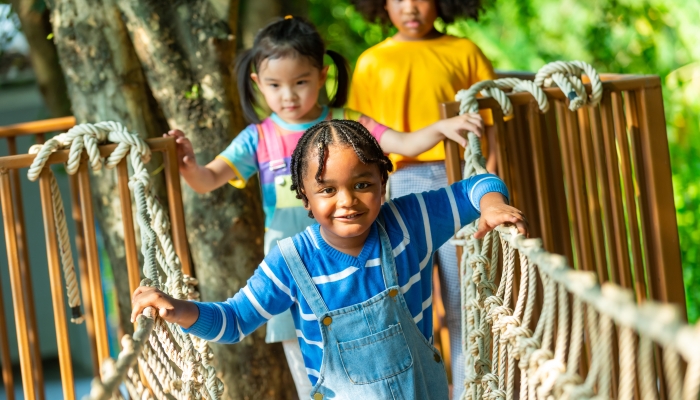
Safety Considerations
As always, it’s important to consider potential safety hazards when planning an activity for your child. An enclosed yard is likely safer than a public space. Always have an up-to-date first aid kit in your home so you can tend to any bumps and cuts.
Make sure you supervise your child carefully and ensure they have the right support in place to take part safely. For children who explore items with their mouths, this could mean keeping a close eye on them in the yard at all times.
Adapting Activities for Different Sensory Needs
You’re the expert on your child, so you’re best placed to make any modifications to ensure a sensory input activity is suitable.
For example, if your child is sensory-avoidant, some of the sensory input activities listed above may be overwhelming. Don’t be afraid to strip down an activity to make it work for your child. Equally, if your child is sensory-seeking, you might want to add extra sensory input elements to each activity for a maximum sensory experience.
Managing Challenges and Overstimulation
You will likely already know how to recognize signs of overstimulation in your child. Whether they become overemotional, uncooperative, or have a meltdown, you’ll know when they’re in need of a less stimulating environment.
If you notice your child showing signs of overstimulation when playing outdoors, switch activities and try one of the following for calming and regulating:
Sensory Breaks
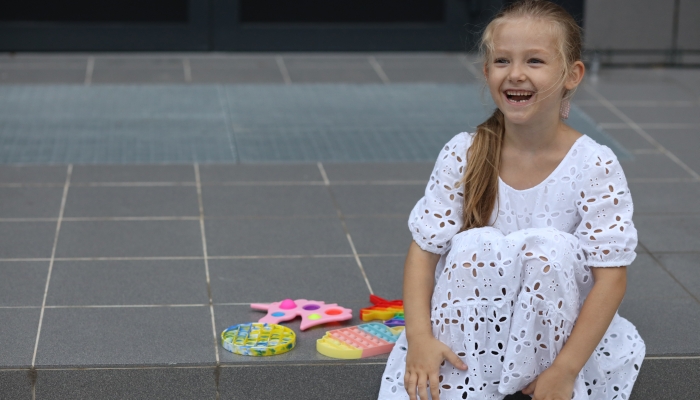
Many schools now offer sensory breaks for children who need them, where children are given a short burst of sensory play to allow them to focus in the classroom afterward. You can utilize sensory breaks at home using the sensory activities listed above.
When the weather allows it, you should make the most of your outdoor space and offer sensory breaks outside. Scheduling regular sensory breaks into your routine can help your child to stay regulated.
Quiet Zones
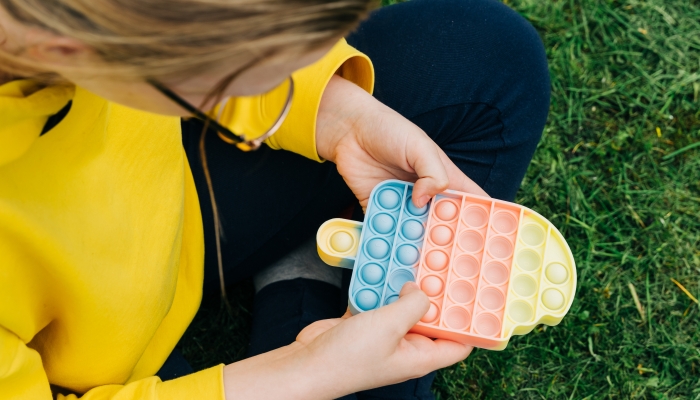
Everybody benefits from some peace and quiet sometimes and a quiet zone could help to calm an overstimulated child. Setting up a quiet zone outside allows your child to escape the house and find sanctuary amongst nature.
The quiet zone should have all-weather flooring and shelter so your child can escape there even if it’s been raining all morning. In fact, the rhythmic sound of rain may be calming for your child. Place some calming sensory toys in the quiet zone, like calming sensory jars, poppers, and other sensory toys your child likes.
Calming Techniques
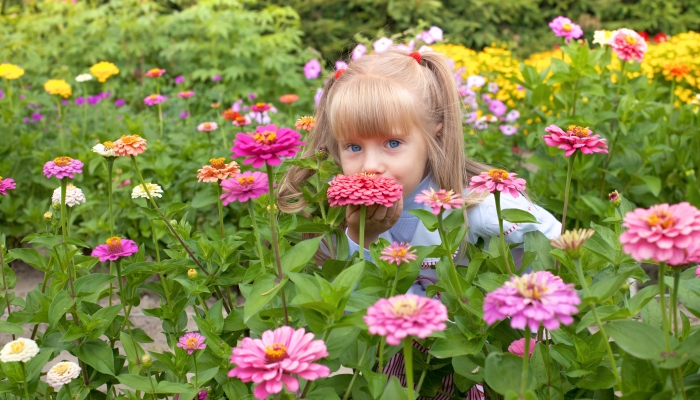
Sometimes, being in nature is all we need to regulate our nervous system, but if your child needs some extra help, the five senses technique is a great one to try.
Have your child identify five things they can see, four things they can touch, three things they can hear, two things they can smell, and one thing they can taste. For the last one, it’s worth having some edible fruit or herbs growing in your garden that your child can explore.
Reference
- Franco, L. S., Shanahan, D. F., & Fuller, R. A. (2017). A Review of the Benefits of Nature Experiences: More Than Meets the Eye. International Journal of Environmental Research and Public Health, 14(8), 864. https://doi.org/10.3390/ijerph14080864
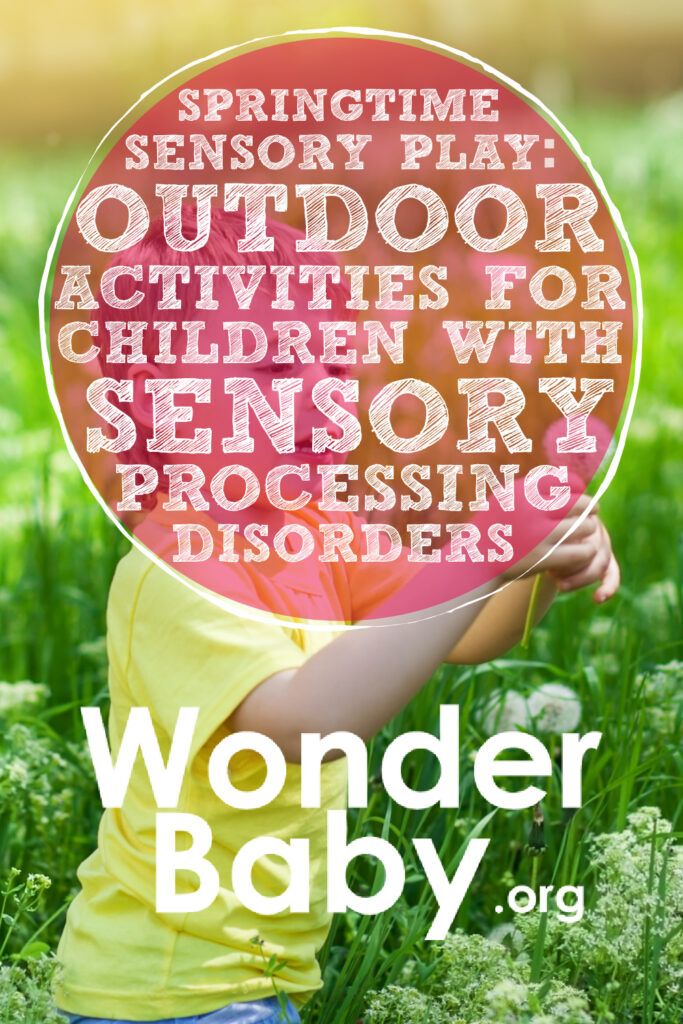
Related Posts

Eye Conditions and Syndromes, Visual Impairment
Neuralink Announces Plans to Restore Sight to the Blind with Brain Chip
Elon Musk’s company Neuralink has announced plans to begin human trials of its new “Blindsight” brain chip by the end of 2025.

Special Needs
5 Spring Cleaning Tips for Families of Children with Disabilities
Spring cleaning is an opportunity to create a more accessible, organized, and supportive space for your child with disabilities. Declutter, deep clean, and refresh!

Visual Impairment
The Gift of Understanding: How a Young Child Helps His Blind Father Navigate Life
When a parent is blind, it’s natural for people to wonder how their sighted child will adapt. Will they struggle to understand their parent’s needs? Will they feel burdened by...



